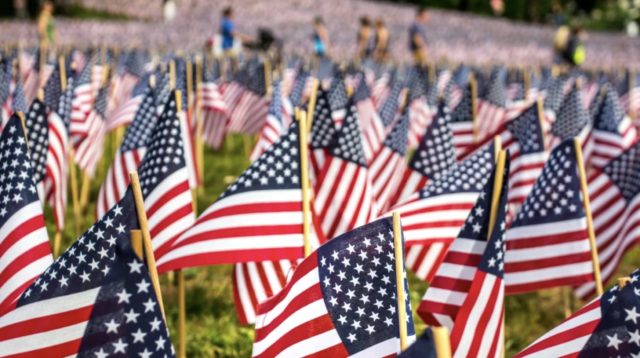America’s Memorial Day is to remember those who “gave their last full measure of devotion” to our country and our cause. Brave men and women fought and died from Bunker Hill to New Orleans to Buena Vista to Shiloh and Cold Harbor to Chateau-Thierry to Cape Esperance and Kasserine Pass to Taejon to Khe Sanh to 73 Easting to Fallujah and Marja and Helmand. Some were drafted, some volunteered; none returned to enjoy the pleasures of what we call our “American way of life,” including the gifts of culture, food, and habits given to America by waves of immigrants who also gave their sons in battle.
America in the 21st century is not only the land between the oceans – Canada and Mexico fit the bill and so does Costa Rica. America, mostly for better and sometimes not, is defined at least as much by what it does as where it is. We have been to war. But we acquired no territory in WWI, WWII or Kuwait – and none in Iraq or Afghanistan or Syria. We stay in Sinai, Niger, and South Korea for them, not for us. Our commitment to NATO protected the free part of Europe from the Soviet Union. We spent a fortune to shield the countries we had just rescued so they could prosper. In Vietnam we tried – and failed – to stem the flow of communism, not to own it but in hopes that it would evolve the way the other “Asian Tigers” did. And, oddly, economically is has – but it is still communist with all that implies. Iraq and Afghanistan were to protect American interests, but no one can doubt that Afghan women, Kurds and Yazidis benefitted from our presence – and suffered when we left.
Yes, we could have saved the money and the lives and still have been a country between the two oceans. But not the same country.
American soldiers, from the Revolution to Syria and in between, are protectors not only of our personal and national freedom, but also of the American belief that more free countries make the world safer. They are important to us precisely because we don’t own them, but associate with them.
Veterans Day in November is to thank living soldiers for their service. But as we lose WWII and Korean War vets at an ever-increasing pace, we are uncomfortably aware that too many American soldiers die without knowing that we appreciate that what they have done provides the space for us to eat, drink, and laugh; to fly our flags; to go to a furniture sale or to the beach on a long, lovely weekend.
While we remember those already gone on this Memorial Day, please also ensure that the next soldier you see knows how you feel – while you can and while he or she can appreciate it.






